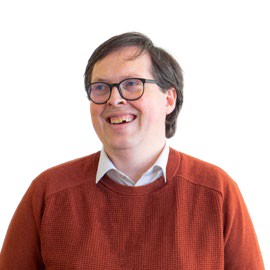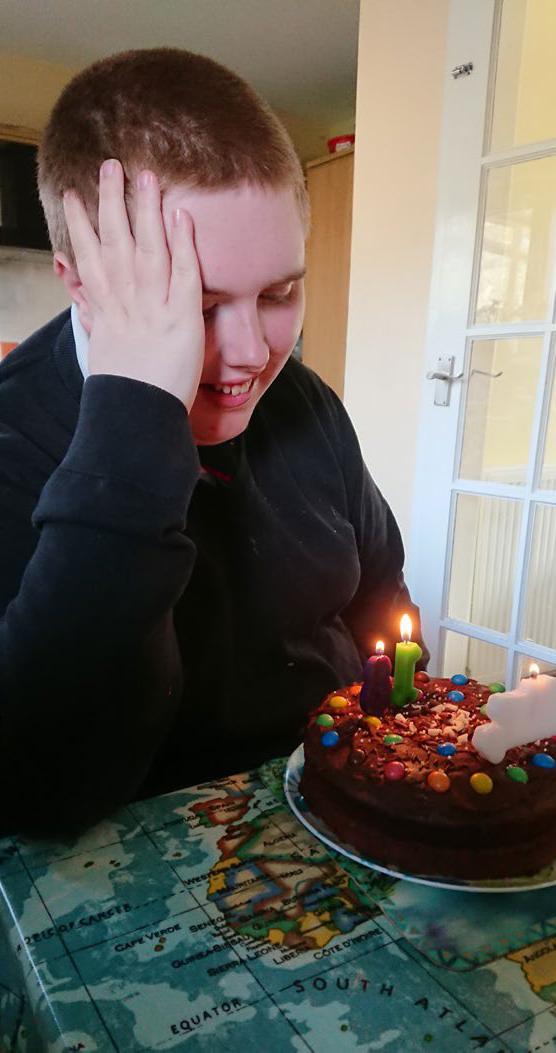A long way to go
Thomas Baldwin reflects on the past decade of living with an autistic child

Thomas Baldwin
WAY back in 2013, I wrote a spiritual piece about life with my autistic son, Luke. During my preparation, I searched a prominent internet shopping site for books offering a Christian response to autism. At the very top of the list was an American title which was subtitled something like ‘Don’t let the devil disrupt God’s plans for you and your child’. I blinked, and a decade passed. The autistic child is now a young autistic adult, and I started to think about a new article. This time, I found the book I needed on the office shelves. ‘Autism and the Church’ by University of Aberdeen theologian Grant Macaskill, published in 2019, includes a summary of current scientific understanding of the condition, a humane theological response to it, and an overview of practical steps churches can take to be inclusive of people with autism. I recommend it wholeheartedly.
“
To say that his disabilities are just ‘difference’ is to deny the reality that he will need lifelong care and support with the most basic of everyday tasks.
The contrast feels like an illustration of how far we’ve come in our understanding of autism and disability more generally. Although the attitudes behind that first book haven’t gone away (during his research, Macaskill came across a website attributing the symptoms of autism to demonic possession), there is certainly greater awareness and acceptance of autistic and other neurodivergent people. This is helped by the theological work of Macaskill and his colleague the Rev Professor John Swinton, and others; and in practical terms by the likes of the two projects for people with disabilities and autism featured in this magazine, as well as longer-standing groups such as the Prospects charity.
Wider understanding, too, seems to have moved on from the Rain Man clichés that were still prevalent ten years ago. Autistic celebrities like the Scottish comedian Fern Brady, climate campaigner Greta Thunberg and the model Christine McGuinness have spoken about their experiences of living with the condition. The Netflix series Atypical split opinion, but was at its best a funny and sensitive portrayal of how autism affects both the autistic person and their family and friends.
As a reminder: autism, as defined by the National Autistic Society, is ‘a lifelong developmental disability which affects how people communicate and interact with the world’. The causes are still not fully understood but it is known to be a result of differences within the brain, most influenced by genetics but also environmental factors. And it cannot be said often enough: there is absolutely no credible evidence of any connection between autism and vaccines.
Those differences manifest themselves as an extremely complicated group of interrelated conditions. Macaskill’s attempt to summarise ‘real autism’ is 30 pages long, but common features include struggling to understand non-verbal communication and social cues, sensory problems such as oversensitivity to sounds and smells, and varying degrees of learning difficulties. Autism itself is not a mental health problem, but people with it are at higher risk of conditions like depression and anxiety.
The approved terminology is constantly in flux. Some like to be identified as ‘autistic’, others prefer ‘people with autism’. Some people find it helpful to talk of a spectrum, for others that is overly simplistic. Some bridle at the word disability – Thunberg says she considers autism her ‘superpower’ – but it certainly encompasses people, such as Luke, with quite profound disabilities. To say that his disabilities are just ‘difference’ is to deny the reality that he will need lifelong care and support with the most basic of everyday tasks.
The past 10 years have seen great strides forward in our understanding of how autism presents in girls and women, after decades of assumption that it was mostly a male condition. There is also some evidence of a connection between autism and gender dysphoria. This is something we’ve experienced in our youngest child, Demetri, who identifies as gender-fluid and is awaiting an autism assessment (waiting lists for both teenage gender and autism services in Scotland are years long).
As for Luke, over the last few years he’s grown into a funny, friendly young adult. He loves animals, especially dogs, but can’t be made to understand that extremities such as ears and tails are not for pulling. He enjoys kids’ TV and any book or toy that has buttons to press, and has an unerring ability to find his favourite videos on YouTube over and over again. He likes his routines, but not so much that we can’t go on holiday or have a day out. He also likes live music, theatre and cinema but won’t keep quiet for long, so we have to be very selective about what we take him to.
Lockdown was difficult. Luke’s learning couldn’t be taught remotely, and getting him to do school tasks was impossible at home. Consequently, he spent a lot of time just snoozing on the couch. At one point he became so quiet and difficult to motivate that we suspected depression, although he recovered once school restarted (and we were very grateful that they kept the special needs unit open during the later school closures).
He did, though, find it hilarious seeing people he knows on a screen, and to this day expects to get the family together on Zoom every birthday.
For his mother, Marie, and I, the last two years in particular have been marked by increasingly frustrating interactions with Scotland’s overstretched medical and social services, as we’ve navigated the various processes needed to be appointed legal guardians (a process that should have taken a few months but ended up lasting a year and a half) and the transition to adult services. I’ve complained about this in the editorial (p3), but I can’t overstate how needlessly stressful this has been, and how bad the uncertainty is for the entire family.
That has been accompanied, for me at least, by the dawning realisation of what this will mean for the rest of our lives. We will have none of the freedoms of most people with grown-up children for many years; and even when Luke does leave home, we will have legal responsibility for him for as long as we’re mentally capable. At an age when many people might begin to think the hands-on, day-to-day aspect of parenthood is in the past, we have a long way to go yet.

Luke on his 18th birthday
One beacon of light in all of this has been our church. We can’t speak more highly of how blessed we are to have found St Ninian’s Church when we moved to Dunfermline. Never once have we felt less than welcome, even when Luke talks through the prayers, even when he decides he wants to leave but changes his mind and lies down halfway down the aisle, even when the image of a chicken on the screen causes a fit of giggles that lasts for the rest of the service. If one of the roles of a church is to welcome and treat everyone as a child of God, then St Ninian’s is an exemplar of that. As Macaskill concludes: “For in Christ there is no Jew nor Greek, slave nor free, male nor female, able or disabled, autistic or neurotypical, but all are one in Christ.”